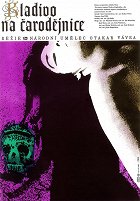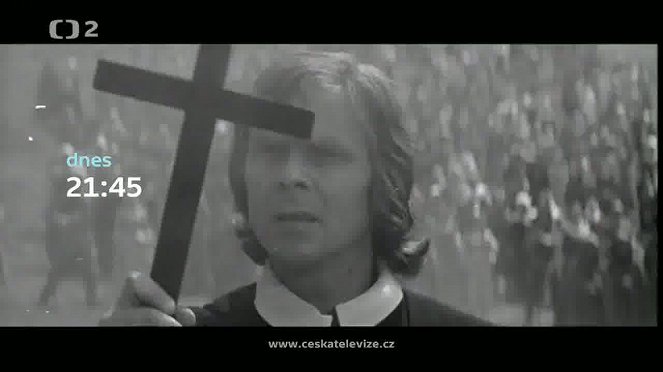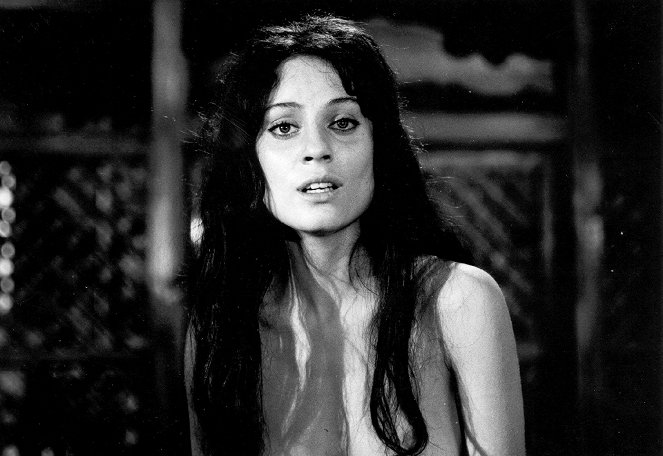Réalisation:
Otakar VávraPhotographie:
Josef IllíkMusique:
Jiří SrnkaActeurs·trices:
Elo Romančík, Vladimír Šmeral, Soňa Valentová, Josef Kemr, Lola Skrbková, Jiřina Štěpničková, Marie Nademlejnská, Miriam Kantorková, Lubor Tokoš (plus)Résumés(1)
Moravie, 1670. Pour avoir dérobé une hostie, croyant soigner sa vache ne donnant plus de lait, une vieille femme se fait accuser de sorcellerie. Le seigneur du pays fait alors venir un tribunal de l'Inquisition pour la juger. L'inquisiteur, Boblig von Edelstadt, s'appuie sur le célèbre manuel Malleus Maleficarum pour mener les interrogatoires. Mais, très vite, les tortures vont succéder aux dénonciations, et les bûchers vont s'allumer, toujours plus nombreux. (Artus Films)
(plus)Vidéo (1)
Critiques (6)
A very dark and depressive work, hands down Otakar Vávra’s best film. Kemr and Šmeral are wonderfully nasty, and the latter in particular excels with the performance of his life. A work so timeless and full of metaphors (indirectly reminiscent of the political monster trials of the 1950s) that it's a wonder it didn't end up in a vault.
()
I rarely happen to increase my original rating after re-watching a film after many years, but here I had to do it because of the film’s timeless message. I am always pleased when it comes to open criticism of the Catholic Inquisition, Muslim fundamentalism or any sort of denunciation movement (like MeToo).
()
In one week, I watched two Czech (actually Czechoslovak) movies that I had wanted to see for a long time. Both are classics of the local film industry, just like their directors are classics themselves. František Vláčil does not have a bad film in his filmography. Otakar Vávra, who created "Witchhammer," also has a rich filmography, which includes countless now classic works. I won't dwell on how much their films are influenced by the times, as they are certainly films that won't leave you indifferent. "Witchhammer" deals with a topic that permeates all genres. The play "The Witches of Salem" is very well known, but that is just one swallow in the whole immense flock. Witchcraft is a period that the Christian church will never forget. Vávra shows the witch hunt in all its cruelty and for me, it was a much stronger experience than the aforementioned play, which at times felt too flat. The fate of a person is not always important because what matters is what the church wants. But even its actions have no logic. A woman confessed to witchcraft on the torture devices. That means she consorted with the devil. A woman did not confess on the torture devices. That means she also consorted with the devil because the devil helped her overcome all pain. The church did not provide an exit for people. It did whatever it wanted. Not because it was the will of God, but because it was the will of man. However, it is easy to justify one's actions with a higher power. If something succeeds, it is only due to our efforts. We are truly incredibly simple in some aspects. The film deeply affected me and I consider it one of the best Czech films, showing that we are not different either. We are beasts. When doors open for us, we enter and take advantage of the opportunity. By the way, another great performance by Mr. Kemr. More: http://www.filmovy-denik.cz/2012/09/navzdy-spolu-marketa-lazarova-pouta.html
()
Witchhammer is an exceptional film in many respects. It is the best film by Otakar Vávra, the darkest and most depressing film of Czechoslovak cinema, and at the same time one of its absolute peaks. Several actors in it received great roles that were the peaks of their acting careers - especially Vladimír Šmeral. The key to the success of the film was the director and the time of its creation. Vávra is one of the most contradictory figures in Czech film history. Talented, knowledgeable in his craft, and with a sense of composition, but on the other hand, supremely pragmatic, adaptable, and opportunistic. The year 1969 was probably the last in which it was possible to freely make films and Vávra, as a knowledgeable person, had no illusions about future developments. He took the opportunity to film what interested him and what he knew intimately - the nature of power and the technology of power abuses. He served political powers for the majority of his life, and thus had plenty of insights, so to speak, first-hand. Several dialogues in the film go to the core and several scenes send shivers down your spine. It is not strictly speaking a historical genre film - the witch trials served only as a starting point for artistic expression. It is also not a story about the Inquisition and a specific time. It is a film about courage and cowardice, manipulation and intimidation. It is not pleasant and its goal is not to entertain. It does not evoke horror, but rather anguish and disgust. Because it became clear during the filming that "this will be a long night," the film does not have any hopeful outcome, and the depressive atmosphere is set from the very beginning by the mercenary song and the subsequent monologue of a fanatic priest. The use of musical motifs is excellent (which is essentially a certainty for Vávra). Overall impression: 95%.
()



Annonces